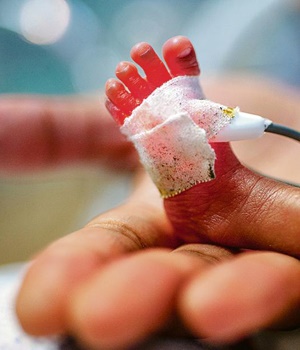
More than 80 000 newborn babies died within just two years as a result of negligence and the poor quality of healthcare in public hospitals, a report has concluded.
Many of the deaths could have been avoided had healthcare workers in public hospitals followed simple guidelines, such as monitoring the heart rate of the foetus and looking after the overall health of the mother.
This shocking revelation is contained in the Saving Babies report, compiled by the Medical Research Council, which traced the number of live births, neonatal deaths and causes of deaths of newborn babies at South Africa’s 588 health facilities between January 2012 and December 2013.
Out of the 82 453 deaths recorded in the report, about 44% occurred at district hospitals and the majority of them were stillbirths.
Researchers found that unexplained stillbirths, spontaneous preterm labour – when a woman goes into labour before her planned delivery date – and intrapartum asphyxia (oxygen deprivation) were the most common causes of deaths in district hospitals and community healthcare centres.
Professor Robert Pattinson, co-author of the report and director of maternal and infant healthcare strategies unit at the Medical Research Council, said: “Most of the deaths due to intrapartum asphyxia could have been avoided if the quality of intrapartum care was improved.”
He explained: “Improving the quality of intrapartum care has to do with improving the knowledge and skills of healthcare providers; ensuring that facilities have the appropriate equipment and human resources; and that there is an efficient, reliable emergency transport system.”
A number of initiatives aimed at improving newborn infant, child and maternal healthcare at district level have been introduced by the national department of health in the past five years, including the introduction of district clinical specialist teams – obstetricians and gynaecologists, paediatricians, family physicians, anaesthetists, midwives and paediatric nurses.
The highly specialised teams that mostly began work in 2012 were tasked with reducing the maternal, infant and child death rates in all of South Africa’s 52 districts as soon as possible. However, their impact, based on the latest official statistics of newborn deaths, has not been that great.
There was no significant difference in terms of the number of babies who died during late stages of pregnancy, birth or in the first four weeks of life in 2010 to 2011 and 2012 to 2013.
The causes of death were also generally the same and, in fact, most of the deaths could have been avoided if proper prevention measures were followed.
However, department of health spokesperson Joe Maila said some efforts had been made to reduce early neonatal mortalities in South Africa.
At the district level, he said, government has implemented Essential Steps to Manage Obstetric Emergencies training.
“We have already seen a 35% reduction in early neonatal deaths. We will expand this training to all districts,” Maila said.
Pattinson agreed with Maila, adding that, at face value, it may seem like nothing has changed, but there have been some improvements at different levels of healthcare.
However, he stressed that a lot of work still needs to be done, not just at district level, but at academic hospitals as well. “The key aspect is to improve the quality of care – this applies to all levels of care,” he said.
Although only 10% of neonatal deaths occurred at tertiary and central hospitals, researchers raised concerns about the unprofessional behaviour of doctors who failed to respond to calls of duty




 Publications
Publications
 Partners
Partners








